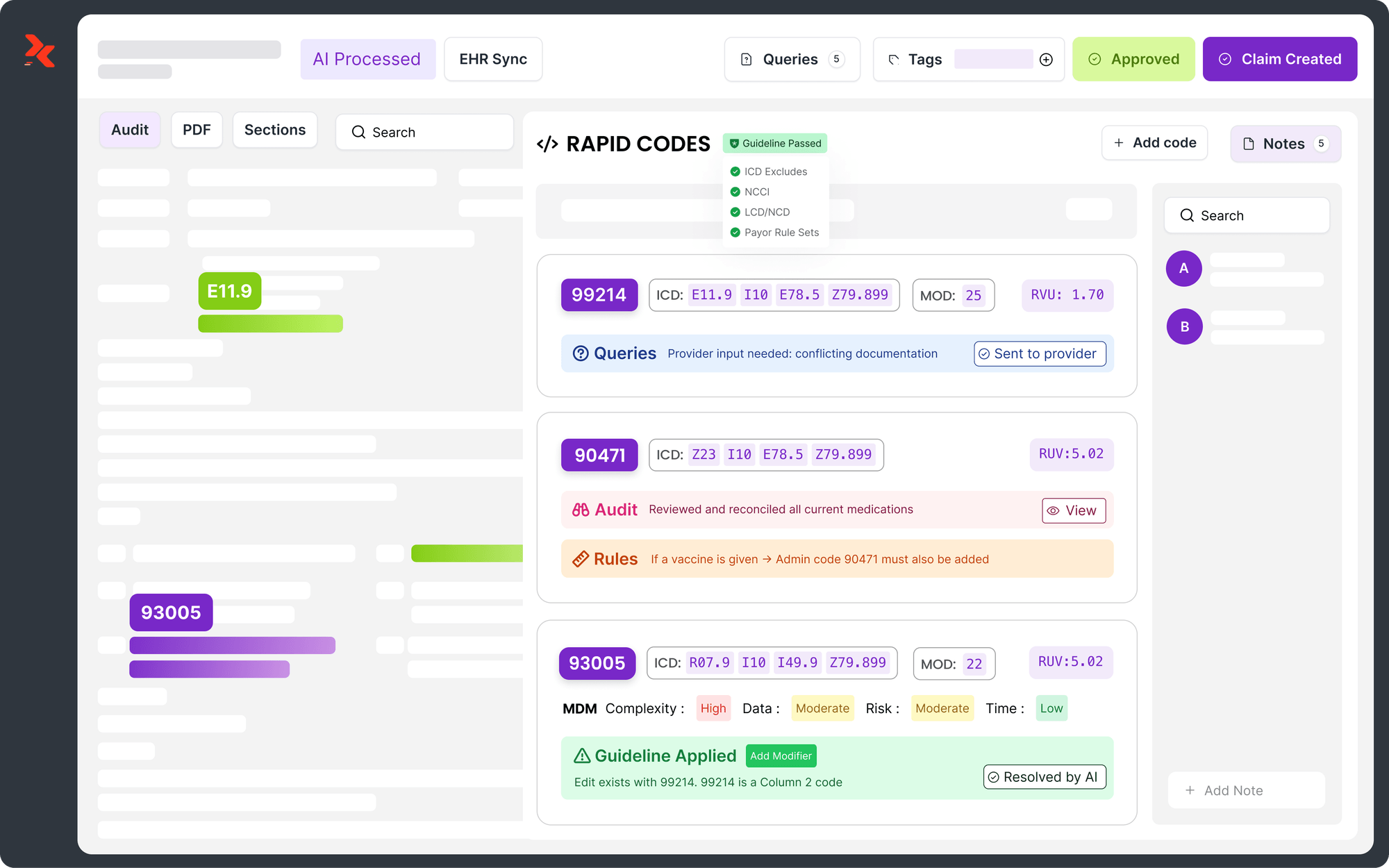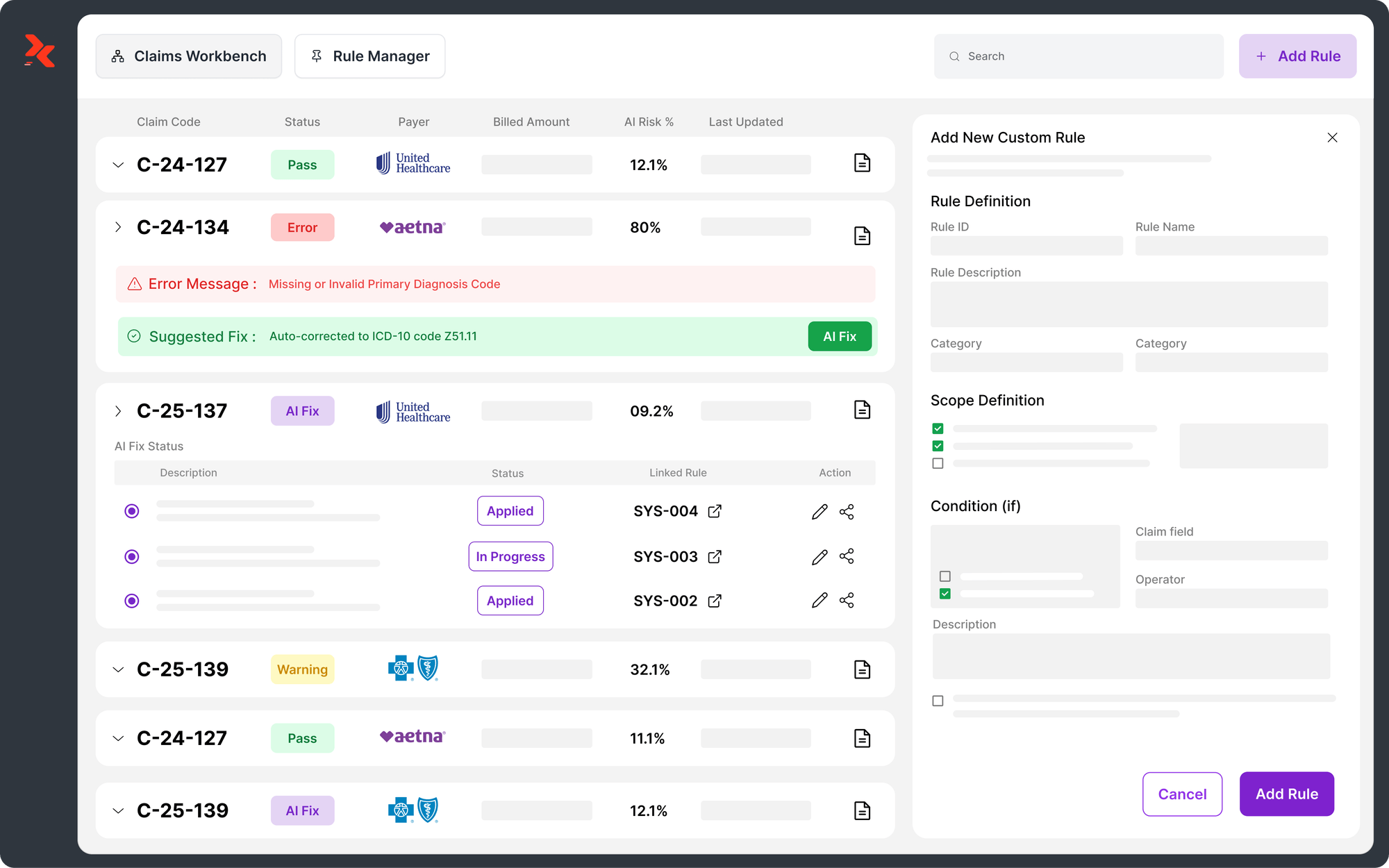Claim Denials: Common Reasons and How to Effectively Resolve Them

Claim denials are a common and unfortunate challenge in the healthcare industry. From hospitals to small clinics, healthcare providers routinely face rejected claims, which can significantly impact revenue and operations. According to recent statistics, 85% of claim denials are preventable, yet 65% remain unaddressed due to a lack of time or understanding of how to resolve them. With the pressure to ensure timely reimbursements, claim denials add challenges to financial stability.
What causes claim denials, and how can they be prevented? This is a critical question that every healthcare professional, medical coder, revenue cycle manager, and compliance officer should be able to answer. Understanding the root causes of claim denials and how to address them effectively is essential for maintaining efficient billing processes and minimizing financial losses.
By the end of this blog, you'll gain insight into the most common reasons for claim denials, along with actionable solutions to tackle and prevent them. But first, let's explore how to analyze and categorize these denials.
Analyzing Claim Rejection vs. Denial
Effectively managing claim denials involves understanding the differences between a rejection and a denial and categorizing them correctly. Rejections are typically due to minor issues, such as missing or incorrect information, and can usually be corrected quickly. Denials, on the other hand, involve more complex problems, such as non-covered services or incorrect coding, which may require a more thorough review and appeals process.
By analyzing these denials and identifying patterns, healthcare organizations can address the root causes and minimize future issues. Once the denial is analyzed, categorizing it correctly is essential for addressing the issue effectively. Now, let’s explore the primary causes behind claim denials and the solutions to resolve them.
Top 6 Reasons for Claim Denials and How to Prevent Them
Claim denials arise for various reasons, and understanding these common causes is crucial to preventing them in the future. Addressing these issues early can save healthcare providers time and money. Below are some of the most frequent reasons why healthcare providers face claim denials:

1. Incorrect Patient Information
Accurate and thorough documentation is crucial for the successful approval of insurance claims. Missing or incorrect details about the patient’s diagnosis, treatment, or procedure can lead to claim denials. All information provided in the claim should be accurate and complete. This includes the following key details:
- Ensure that the provider's information, including their name, address, and National Provider Identifier (NPI), is accurate and complete.
- Patient details should include name, date of birth, address, and insurance policy number.
- The codes, including procedure, diagnosis, and place of service, must accurately reflect the service or treatment provided. The procedure code must match the service delivered, the diagnosis code must be medically necessary and supported by medical records, and the place of service code must correspond to the location where the service was rendered.
- Provide supporting documentation, such as medical records, prescriptions, and referral forms.
2. Lack of Prior Authorization
Certain insurance plans require healthcare providers to obtain prior authorization for specific services, medications, or procedures before coverage is approved. The insurance company may deny the claim if providers fail to secure prior approval. Services that commonly require prior authorization include the following:
- MRI and CT imaging
- Certain prescription medications
- Referrals to specialists
- Elective surgical procedures
3. Lack of Medical Necessity or Supporting Documentation
Insurance companies may refuse to process a claim if they believe the service or treatment was not medically necessary or the provided documentation does not sufficiently justify it. For example, a surgical procedure may be denied if it is deemed that physical therapy would be an adequate treatment. To address such denials, an appeal may require the submission of the following:
- Additional documentation like medical records, prescriptions, or referral forms.
- Detailed justifications for any tests or treatments administered.
- A “Letter of Medical Necessity” from the attending physician.
- More specific or updated coding for the service.
- A more comprehensive explanation of the patient’s visit or condition.
- Information relevant to the insurance policy’s criteria for coverage.
4. Coding Errors
Incorrect or outdated codes cause significant delays and denials. You must code each claim accurately to reflect the specific services provided. The following steps can help avoid coding errors:
- Correct use of HCPCS, ICD-10 and CPT codes for diagnoses and procedures.
- Regular updates to medical coding practices based on the latest standards.
- Double-checking codes for accuracy before submitting claims to avoid rejections.
5. Services Not Covered or Out-of-Network Providers
Claims may get denied if the patient's insurance policy doesn't cover the service or the healthcare provider is out of network. To prevent this, follow these steps:
- Confirm the patient’s coverage for specific services.
- Verify that the provider is within the insurance network.
- Perform pre-authorization checks to ensure the service is covered under the plan.
6. Duplicate Claims and Service Bundling
Duplicate claims occur when a provider submits the same claim more than once, either intentionally or accidentally, leading to denials. Service bundling happens when multiple services are grouped together under one claim, which can lead to errors or underpayments if not handled correctly. To prevent this, follow these best practices:
- Check if a claim has already been submitted before submitting a new one.
- Verify that you bundle services correctly according to the payer’s guidelines.
- Document any modifications to services clearly to avoid duplicate submissions.
- Regularly audit claims to identify potential duplicates or incorrect bundling.
RapidClaims addresses these issues by detecting coding errors and missing documentation before claim submission, which helps ensure smoother operations and faster reimbursements. Additionally, its AI-driven real-time insights improve claim acceptance rates, while seamlessly integrating with hospitals, physician groups, medical billing companies, and Accountable Care Organizations (ACOs) to enhance overall workflow efficiency.
Denial Management and Resolution Strategies
Denial management is a crucial part of the healthcare revenue cycle. Addressing claim denials quickly and efficiently ensures that cash flow remains uninterrupted. Below are some key strategies for effectively managing and resolving denials:

1. Ensure Clean Claims Through Training and Audits: Proper staff training on coding, documentation, and insurance requirements is essential for submitting clean claims. Regular audits can help identify errors before claims are submitted, reducing the risk of denials.
2. Identify the Root Cause and Implement Corrective Actions: Investigate the cause of the claim denial, whether it's due to incorrect coding, missing documentation, or lack of prior authorization. Once you identify the root cause, implement corrective actions to prevent similar issues in future claims submissions.
3. Appeal Denied Claims with Proper Documentation: For claims that are denied, submit a well-documented appeal within the required time frame. Include all necessary evidence and explanations to demonstrate why the claim should be reconsidered. A clear, concise appeal increases the likelihood of a successful resolution.
4. Use Technology Solutions to Streamline the Process: Adopt tools like claim scrubbers and automated systems to identify potential errors in claims before they are submitted. Technologies like RapidClaims help ensure compliance with payer requirements and reduce human errors, improving the accuracy of claims and decreasing the risk of denials.
5. Monitor Denial Trends and Take Preventive Measures: Track and analyze recurring denial patterns. By identifying trends, you can make data-driven decisions to improve the claims process and implement preventive measures, ensuring more claims are processed successfully.
By utilizing AI and automation, RapidClaims helps reduce claim denials through coding accuracy, accelerates the revenue cycle by processing over 100 charts per minute, and ensures compliance with regulatory requirements via built-in rule sets. Streamline your workflow and enhance your revenue cycle management with RapidClaims today!
Tools and Technologies for Denial Prevention
Preventing claim denials before they happen is essential for improving the efficiency of healthcare operations. Here are a few tools and technologies that can help reduce the risk of denials and streamline the claims process:

1. Automated Eligibility Verification Systems
These tools allow healthcare providers to verify a patient’s insurance coverage in real-time, reducing the chances of submitting claims with incorrect or outdated insurance information. By ensuring that claims are submitted with accurate data, the risk of denial due to eligibility issues is minimized.
2. Claim Scrubbing Software
Claim scrubbing software checks for errors and inconsistencies in claims before they are submitted to insurance companies. This software can identify missing information, incorrect codes, and other potential issues that may result in a denial. By catching these errors early, providers can reduce the chances of having claims rejected.
3. Revenue Cycle Management (RCM) Software
Revenue Cycle Management software offers a comprehensive approach to managing the entire revenue cycle, from patient registration to final payment. It automates many tasks such as coding, billing, and follow-up, ensuring that claims are accurate and submitted on time. The system can also flag potential issues in real-time, allowing teams to address them before the claim is processed.
4. Artificial Intelligence (AI) Solutions
Artificial Intelligence powered tools can analyze patterns in denial data and predict which claims are at risk of being denied. These tools can also recommend corrective actions, enabling providers to take proactive steps to prevent denials. By analyzing large datasets, AI helps identify trends and areas of improvement, allowing healthcare teams to make informed decisions.
5. Claim Tracking Systems
Claim tracking systems provide visibility into the status of each claim, making it easier for healthcare providers to monitor progress and identify issues before they lead to denials. These systems can also alert staff about missing documentation or other issues that could delay or prevent payment, enabling quicker resolution and minimizing denial rates.
6. Decision Tree Approaches and Outsourcing Specialized Tasks
Decision trees can guide healthcare providers through the claims process, helping them make the correct decisions at each step. Additionally, outsourcing specialized tasks, such as coding and medical billing, can help reduce denials by ensuring that experts handle the process.
Utilizing these tools and technologies allows healthcare organizations to reduce the frequency of claim denials, improve revenue cycle efficiency, and ensure smoother financial operations.
Also Read: RapidCode and RapidAssist:The Dynamic Duo in Healthcare Coding Software.
How RapidClaims Transforms Claim Denials into Reimbursement Success?

RapidClaims is an advanced AI-powered platform that automates medical coding, streamlines operations, and cuts administrative costs. It optimizes reimbursement processes and ensures full compliance with ever-evolving healthcare standards. With a 75% reduction in preventable denials and a 5-day faster A/R recovery, RapidClaims improves financial performance. Its extensive smart edits library, featuring over 119 million edits, ensures that claims are accurate and compliant, further reducing the likelihood of denials.
- Explainable & Compliant AI
Every code assigned by RapidClaims leaves a full audit trail, ensuring transparency. The AI understands medical notes, diagnoses, and procedures with precision, ensuring compliance with ICD-10, CPT, HCPCS, and E&M coding standards.
- Customized AI & Rule Sets
The platform customizes coding logic to meet the needs of different specialties and providers. It automatically updates coding rules based on payer policies, NCCI edits, and LCD/NCD compliance, ensuring flexibility across various requirements.
With automated coding, AI-driven workflow optimization, and real-time insights, RapidClaims ensures accuracy and efficiency throughout the claims process.
Conclusion
Handling claim denials remains a persistent challenge for healthcare providers, with issues ranging from missing or incorrect information to prior authorization problems. AI-powered platforms like RapidClaims address these challenges by transforming claims data into actionable insights and measurable financial improvements. By proactively identifying and resolving potential issues before submission, RapidClaims significantly boosts cash flow.
Ready to Enhance Your Revenue Cycle Management?
Discover how RapidClaims can drive financial improvements and resolve claims issues with AI automation and real-time insights. Schedule a Free Demo today and see how we can help you improve your claim acceptance rates.
FAQs
1. How long do I have to appeal a denied claim?
Most insurance companies give a specified period (often 30 to 180 days) to appeal a denied claim. Be sure to submit your appeal within the stated timeframe to avoid losing the chance for reconsideration.
2. Can I file a claim denial appeal without a denial notice?
No, you generally need the official denial notice from your insurer to begin the appeal process. Ensure you receive the denial letter outlining the reason for the denial and how to proceed with an appeal.
3. How can I handle a claim denial due to timely filing issues?
Most insurance plans have a filing deadline for claims. If your claim is denied because it was filed late, check if the insurance company has any exceptions or extensions, and submit your appeal along with any valid reasons for the delay.
4. What should I do if my claim gets denied for exceeding benefit limits?
Some insurance policies have annual or lifetime benefit caps. If your claim exceeds these limits, check your policy details and discuss them with your insurer. You can appeal or explore other funding options, such as secondary insurance if the treatment is necessary.
5. How do I handle denials for claim reimbursement for out-of-pocket expenses?
If your insurer denies reimbursement for out-of-pocket expenses, verify the expenses against your policy to ensure they are covered. You can also appeal by providing detailed receipts and medical documentation to prove the need for reimbursement.
6. Can I file multiple appeals for a denied claim?
Yes, you can file multiple appeals for a denied claim as long as you meet the deadlines and present new or additional supporting evidence with each submission. Keep a detailed record of each appeal and communication with the insurer.
Rejones Patta
Rejones Patta is a knowledgeable medical coder with 4 years of experience in E/M Outpatient and ED Facility coding, committed to accurate charge capture, compliance adherence, and improved reimbursement efficiency at RapidClaims.
Latest Post
Top Products

%201.png)








